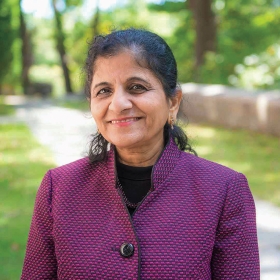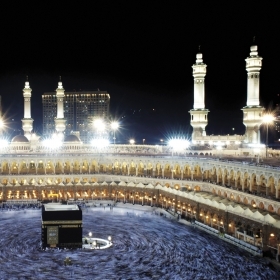“I want my students to think about what it means to be human,” says Neelima Shukla-Bhatt, associate professor and director of the South Asia Studies program. She asks them to consider: “What is sacred to me? How does my humanity connect to the rest of the world?”

Photo by Richard Howard
“I want my students to think about what it means to be human,” says Neelima Shukla-Bhatt, associate professor and director of the South Asia Studies program. She asks them to consider: “What is sacred to me? How does my humanity connect to the rest of the world?” Once the discussion gets going, students “become animated and energized,” says Shukla-Bhatt. “It’s lovely to see.”
The course in which Shukla-Bhatt poses these heady questions is Sacred Arts of South Asia. For most of human history, she explains, people have approached religion not through prose texts but through other media—poetry, architecture, sculpture, music, painting, and performance. This course explores “how art expresses religious ideas” and is organized thematically by major religions in South Asia—Buddhism, Hinduism, Islam, Christianity, and Sikhism. Near the end of the course, Shukla-Bhatt asks students to express something sacred to them through an aesthetic medium. Students who are not religious have chosen subjects like nature, music, and movement. The idea, she explains, is to help students understand how artistic expression can deepen their connection to whatever they consider sacred.
Shukla-Bhatt hails from Surat, Gujarat, in western India, and had studied English literature and taught at the college level before coming to the United States. She was at first unable to find a teaching job here, however, and eventually applied to doctoral programs in religion after much encouragement from her husband to follow her passion. (She earned her Ph.D. from Harvard.) Much of her research has focused on devotional poetry, particularly 13th–18th century poetry from northern India, but she also studies Hinduism, Hindu women, Hindu goddesses, Gandhi’s life and work, folk dance, and the role of popular media in South Asia.
In 2004, Shukla-Bhatt came to Wellesley as a post-doctoral fellow, and in 2006, when the South Asia Studies program was established, she began teaching full-time. A decade later, she continues to be the only faculty member with a full-time appointment in the program. Shukla-Bhatt teaches both content courses and language courses—Wellesley offers two years of Hindi/Urdu—and cannot say enough about how wonderful her students are or how supportive the administration is. “This is a dream place to work,” she says.
